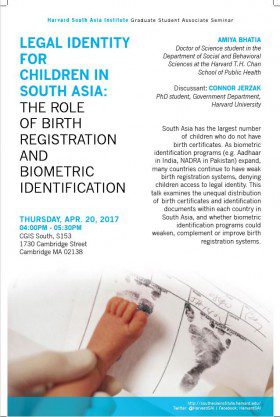Legal Identity for Children in South Asia: The Role of Birth Registration and Biometric Identification
WHEN
Thu, Apr 20, 2017 from 04:00pm — 05:30pm, ET
{
"name":"Legal Identity for Children in South Asia: The Role of Birth Registration and Biometric Identification",
"description":"Graduate Student Associate Seminar Amiya Bhatia, Doctor of Science student in the Department of Social and Behavioral Sciences at the Harvard T.H. Chan School of Public Health Discussant: Connor Jerzak, PhD student, Government Department South Asia has the largest number of children who do not have birth certificates. As biometric identification programs (e.g. Aadhaar in India, NADRA in […]",
"startDate":"2017-04-20",
"endDate":"2017-04-20",
"startTime":"16:00",
"endTime":"17:30",
"location":"",
"label":"Add to Calendar",
"options":[
"Apple",
"Google",
"iCal",
"Microsoft365",
"MicrosoftTeams",
"Outlook.com",
"Yahoo"
],
"timeZone":"America/New_York",
"inline":true,
"listStyle":"dropdown-static",
"iCalFileName":"Mittal-Event-2017-04-20"
}
Graduate Student Associate Seminar
Amiya Bhatia, Doctor of Science student in the Department of Social and Behavioral Sciences at the Harvard T.H. Chan School of Public Health
Discussant: Connor Jerzak, PhD student, Government Department
South Asia has the largest number of children who do not have birth certificates. As biometric identification programs (e.g. Aadhaar in India, NADRA in Pakistan) expand, many countries continue to have weak birth registration systems, denying children access to legal identity. This talk examines the unequal distribution of birth certificates and identification documents within each country in South Asia, and whether biometric identification programs could weaken, complement or improve birth registration systems.

